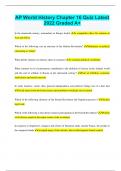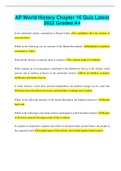Abolition of serfdom - Study guides, Class notes & Summaries
Looking for the best study guides, study notes and summaries about Abolition of serfdom? On this page you'll find 20 study documents about Abolition of serfdom.
All 20 results
Sort by

-
Human Rights Exam Questions and Answers 100% Pass
- Exam (elaborations) • 24 pages • 2024
- Available in package deal
-
- $12.49
- + learn more
Human Rights Exam Questions and Answers 100% Pass Definition of HR - Answer- Human rights refer to fundamental rights and freedoms that are believed to belong to all human beings. As stated in the UDHR, these rights differ from ordinary rights under domestic law in that they are considered to be *universal, inalienable and inherent.* Abolition of Slavery - Answer- Slavery = forced labour in which a person is considered to be the property of another. Moves to abolish slavery in Europe beg...

-
Human Rights Exam Questions and Answers 100% Pass
- Exam (elaborations) • 24 pages • 2024
- Available in package deal
-
- $12.49
- + learn more
Human Rights Exam Questions and Answers 100% Pass Definition of HR - Answer- Human rights refer to fundamental rights and freedoms that are believed to belong to all human beings. As stated in the UDHR, these rights differ from ordinary rights under domestic law in that they are considered to be *universal, inalienable and inherent.* Abolition of Slavery - Answer- Slavery = forced labour in which a person is considered to be the property of another. Moves to abolish slavery in Europe beg...

-
Human Rights Exam Questions and Answers 100% Pass
- Exam (elaborations) • 24 pages • 2024
-
- $12.49
- + learn more
Human Rights Exam Questions and Answers 100% Pass Definition of HR - Answer- Human rights refer to fundamental rights and freedoms that are believed to belong to all human beings. As stated in the UDHR, these rights differ from ordinary rights under domestic law in that they are considered to be *universal, inalienable and inherent.* Abolition of Slavery - Answer- Slavery = forced labour in which a person is considered to be the property of another. Moves to abolish slavery in Europe beg...

-
AP World History Chapter 16 Quiz Latest 2022 Graded A+
- Exam (elaborations) • 4 pages • 2023
-
- $7.99
- + learn more
In the nineteenth century, nationalism in Europe fueled, a competitive drive for colonies in Asia and Africa Which of the following was an outcome of the Haitian Revolution? Definition of political citizenship as "black" What did the Atlantic revolutions share in common? a common political vocabulary What common set of circumstances contributed to the abolition of slavery in the Atlantic world and the end of serfdom in Russia in the nineteenth century? Fear of rebellion, economic ineffi...

-
Ch. 25 AP EUROPEAN HISTORY EXAMS QUESTIONS AND ANSWERS
- Exam (elaborations) • 6 pages • 2024
-
Available in package deal
-
- $13.49
- + learn more
Ch. 25 AP European History B. - Answer-The first state to enact social welfare legislation was A) England. B) Germany. C) France. D) the United States. E) Austria-Hungary. E. - Answer-Which statement below best characterizes Napoleon III's economic policies? A) They were mercantilist. B) They were laissez-faire. C) They aimed at nationalization of major industries. D) They favored the interests of landed aristocrats. E) They used government action to stimulate railroad buildi...

-
WORLD REGIONS IN GLOBAL CONTEXT PEOPLES PLACES AND ENVIRONMENTS 6Th Ed By SALLIE A - Test Bank
- Exam (elaborations) • 334 pages • 2023
-
- $23.42
- + learn more
World Regions in Global Context, 6e (Marston) Chapter 3 The Russian Federation, Central Asia, and the Transcaucasus 1) What is permafrost? A) permanently frozen subsurface material B) cold-resistant vegetation C) a food preservation technique used by Siberian natives D) the soil in the steppes E) none of these Answer: A Diff: 1 Section: Environment, Society, and Sustainability Geog. Standard: N4 The physical and human characteristics of places Bloom's Taxonomy: Remembering/U...

-
AP World History Unit 5 Study Guide 2023
- Exam (elaborations) • 7 pages • 2023
-
Available in package deal
-
- $9.99
- + learn more
Main Enlightenment ideals - Answer- -truth -natural law > divine law -reason/logic -improvement through education -human experience Previous/old mindsets - Answer- -religion -divine law -tradition -absolute monarchy What factors facilitated the spread of Enlightenment ideals within and outside of Europe? - Answer- -commentary, support, and contribution from philosophers -dissatisfaction with absolutism -desire for more rights/freedoms Natural Rights - Answer- all people are...

-
AP World History Chapter 16 Quiz Latest 2022 Graded A+
- Exam (elaborations) • 4 pages • 2023
-
- $4.49
- + learn more
In the nineteenth century, nationalism in Europe fueled, a competitive drive for colonies in Asia and Africa Which of the following was an outcome of the Haitian Revolution? Definition of political citizenship as "black" What did the Atlantic revolutions share in common? a common political vocabulary What common set of circumstances contributed to the abolition of slavery in the Atlantic world and the end of serfdom in Russia in the nineteenth century? Fear of rebellion, economic ineffi...

-
Enlightenment Questions and Answers Already Graded A
- Exam (elaborations) • 20 pages • 2023
-
Available in package deal
-
- $9.49
- + learn more
Enlightenment Questions and Answers Already Graded A Enlightenment A movement in the 18th century that advocated the use of reason in the reappraisal of accepted ideas and social institutions., "natural laws". celebrate the power of human reason, argued that rational thought could create progress and knowledge. Control over own life and society., 18th century movement which emphasized modern practical achievements of knowledge, religious toleration and liberty., 18th and 19th century. Also age...

-
AQA GCSE HISTORY - Power and the People Questions and answers 2023
- Exam (elaborations) • 18 pages • 2023
-
Available in package deal
-
- $22.49
- + learn more
AQA GCSE HISTORY - Power and the People Questions and answers 2023 MEDIEVAL SOCIETY Was based on the FEUDAL SYSTEM The KING was EXPECTED to be a STRONG LEADER / EXCELLENT WARRIOR + to CONSULT w/ HIS BARONS THE CHURCH also held A LOT OF POWER THE FEUDAL SYSTEM KING: >>RULES the COUNTRY >>GRANTS LAND to NOBLES BARONS (NOBLES): >>PROVIDE LOYALTY + SERVICE TO THE KING: MAINTAIN LAW + ORDER in their |AREAS RAISE an ARMY for the KING when NEEDED >>GRANT L...

Did you know that on average a seller on Stuvia earns $82 per month selling study resources? Hmm, hint, hint. Discover all about earning on Stuvia


